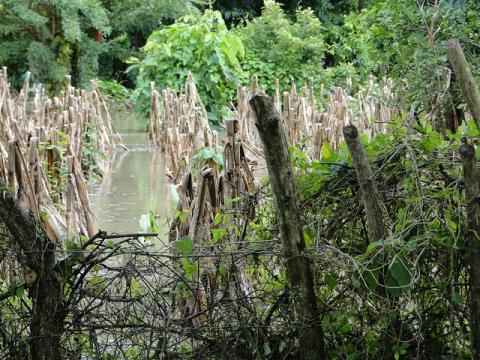
Photo of destroyed cornfield from Comunidades Unidas del Bajo Lempa
Both the Gospel and the Hebrew Scriptures today speak of a call to faith during difficult times. We see celebration in spite of scarcity, the mother who brings creativity and resourcefulness, the coming of the reign of God to the most forgotten and disenfranchised.
If you ask any Salvadoran today what he or she most hopes and prays for, that person will list security as a number one preoccupation; after that she or he would list employment, food, health care, and other concerns. Every home and building is surrounded with razor wire, and every business has an armed guard standing outside, but no one feels secure.
A few weeks ago we had a storm that took everyone by surprise. It wasn’t called a tsunami or another strange name, but it took many lives including 16 children who were washed away in the towns and countryside areas where they lived. While the storm was still raging an interesting article appeared in the local paper (edited for brevity):
With power saws, machetes and shovels, residents of the Salvadoran Lower Lempa River Basin, near the Pacific Ocean, worked to unblock the waterway, cutting branches from the trees on the banks to prevent them from washing into the chocolate colored water. One crew works on the Espino River, another does the same in the El Barbollón River, and other rivers in the Bajo Lempa area. When the waters flow freely, the rivers don’t flood the crops, a more and more frequent phenomenon with the unpredictable cycles of rain and low waters caused by global warming.
Several kilometers to the south, in the mangroves of the Bay of Jiquilisco, Brenda Sanchez is moving in waist-high water in a canal in the Cuche de Monte tideland. She and 30 other women have re-opened the flow of saltwater. With machetes and plastic buckets they’ve cleared the mangroves and mud wrapped around the roots of large trees which prevented the freeflow of water back to the sea.
Many of the women and men in the process of reclaiming the land and protecting the mangroves which shield the coast from destruction were former combatants during the 1980s and are using their organizational ability to identify the factors of destruction and to foster re-construction in this corner of El Salvador. It is so important to recognize that although land has been abused and practically destroyed by the abuse of pesticides in the cultivation of certain crops like cotton, and ravaged by war, land is still the source of life, the heritage of the people. If the land is abandoned, the people will be forced to migrate to the cities or even to foreign lands.
In the reading from Isaiah (62: 1-5), God speaks to the people of the land: “You shall no more be termed Forsaken, and your land shall no more be termed Desolate; but you shall called My Delight. . .so shall your God rejoice over you.” The language is strange to our ears, but thinking of the reality of El Salvador with the continued violence and desolation that is still present as a carry-over from the years of conflict, and then witness the new harvest of grain on lands that were once destroyed by pesticides, then stripped of their protection by the loss of much of the mangroves, we can say: YES, God is rejoicing over our people – the land is yielding peace, joy and security.
We went down to visit several of the communities a few days after the storm when the truck was able to get through the mud. We took some bedding and foodstuffs, which of course were badly needed, but we went mostly to see how the people had survived. They told many stories, but what came up again and again was: You didn’t forget us!
People ask me sometimes: What do you do as a missioner? There are some specific things we do, but more than anything, we accompany the people – recognize them for who they are, that wherever they are from or what they do; we listen and learn from them. Their lives are hard, but when they band together their wisdom is nourished – there is delight in community. God is with us.
